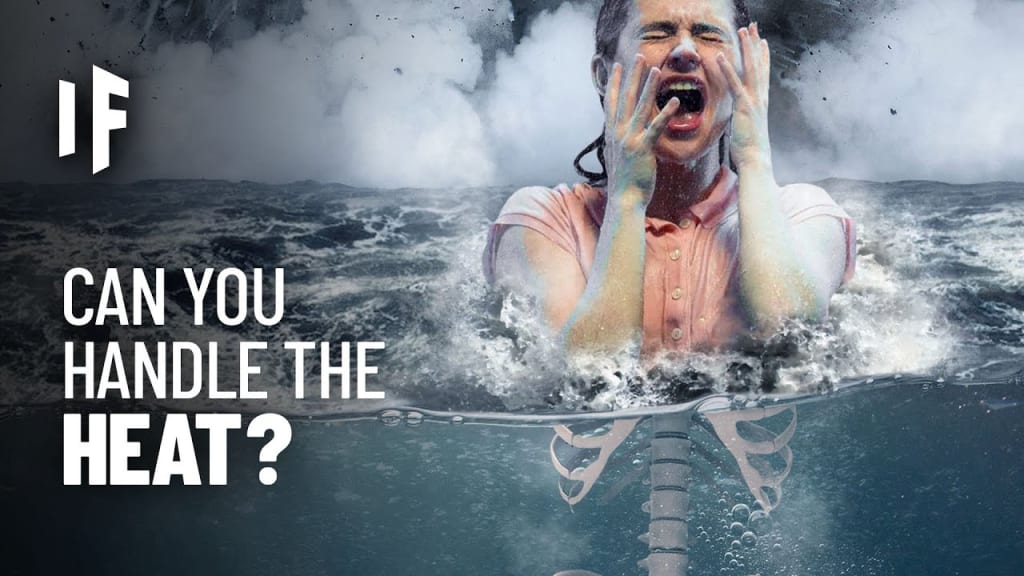What If Earth Reached Boiling Point for 5 Seconds..?
Did you survive..?

Get ready for some serious burns and the instantaneous death of organisms.
Let's turn up the heat and bring the entire planet to a boil for five whole seconds.
While you might complain about roasting in the blistering heat of a summer day, the average temperature on Earth is around 13.9 °C (57 °F).
Compare that to the hottest places on the planet, like China's Flaming Mountains or Iran's Lut Desert, which have recorded land temperatures around 70 °C (158 °F).
That's still not nearly as hot as a cup of boiling hot tea.
Water reaches its boiling point at 100 °C (212 °F).
This is the point where liquid water turns into water vapor.
With 71% of the Earth's surface covered in water, life is about to feel like you're stuck inside one giant kettle.
If temperatures suddenly spiked, you wouldn't necessarily need to worry about everything going up in flames.
At least not right away.
Wood ignites at around 300 °C (572 °F).
And while you could be imagining that all the water in the oceans would suddenly boil away, don't worry, that wouldn't happen either.
That's because the deeper you go into the ocean, the higher the pressure. And this affects the boiling temperature.
Already at 10 m (32 ft) below the water's surface, the boiling point becomes closer to 120 °C (248 °F).
So not all the ocean water on Earth would turn into vapor.
But in the steamy shallow waters, most living organisms, plants and animals would likely spend these five seconds boiling to death.
Maybe only thermophiles, microorganisms that thrive at temperatures up to 108 °C (226 °F), would survive unscathed.
You wouldn't enjoy this brief apocalyptic window of time very much either.
The steam would scald your skin and seriously injure your eyes.
Even just taking a breath during this time
could cause mucous membranes in your mouth, nose and throat to suffer severe burns.
If these burns were deep enough to destroy tissues,
you could end up developing rhabdomyolysis.
This condition could result in permanent damage to your heart and kidneys. Or even death.
But that's not even the worst.
There's also a lot of ready-to-boil water somewhere else. In your body.
Yeah, you're about 60% water. If this water to turn into steam,
you'd know it.
Your body's water would suddenly increase in volume by 1,600 times.
Well, you and anything else that has water inside it would simply explode from the inside out.
But maybe you'd be lucky and five seconds wouldn't be long enough to detonate you.
That wouldn't mean that life following the worst heat wave imaginable would go right back to normal.
No, immediately after the five seconds, the global temperatures would drastically drop.
And all that water vapor would transform back into liquid.
You'd better be prepared for some crazy flash flooding and extreme weather.
And that steam turning back into water would bump the temperatures in the surrounding environment.
Things could heat back up enough that polar ice caps and glaciers would melt even faster.
When all that ice disappeared, the sea levels would rise by about 70 m (230 ft).
Even though Earth would only have boiled for about the same amount of time it takes for one big yawn, it would create circumstances
where major cities around the world could become flooded and uninhabitable.
Millions of people could die in the aftermath.
And that's if they didn't already turn into spontaneous steam bombs…
Thanks for reading and stay tuned for another story...
Please give us a like if you love this...
Tack care 🙂
About the Creator
mohamed irsath
what if… if you follow my page…






Comments
There are no comments for this story
Be the first to respond and start the conversation.